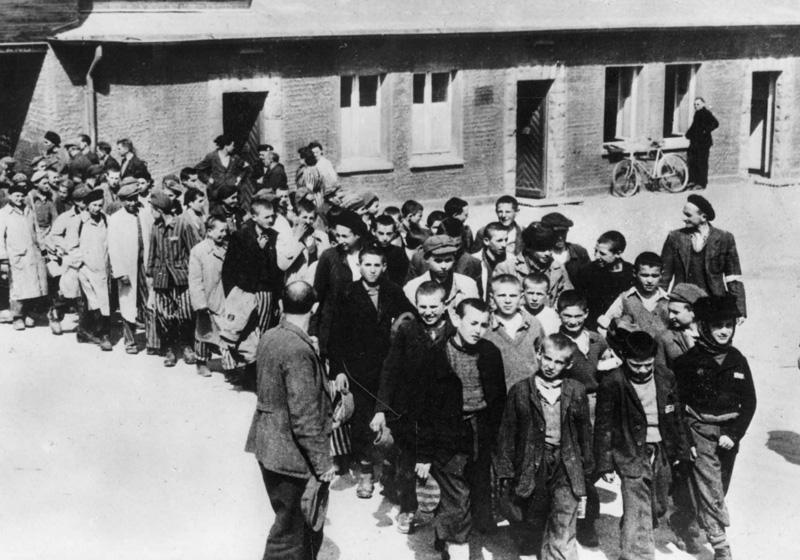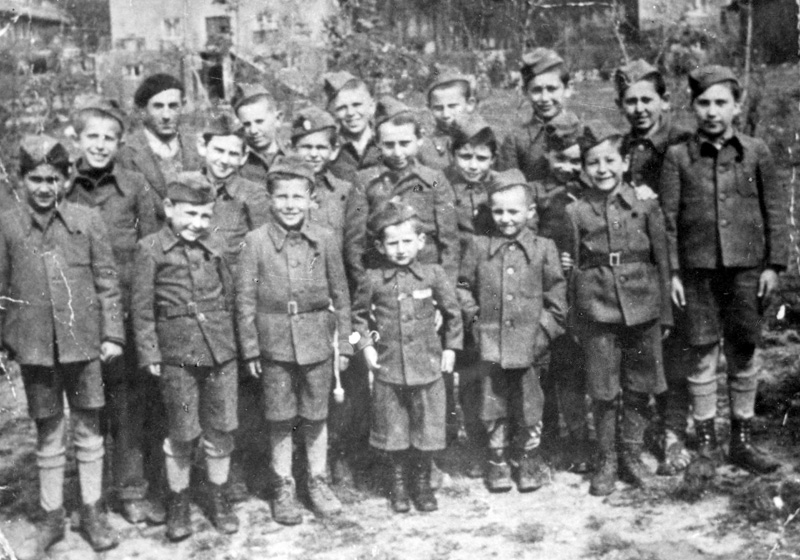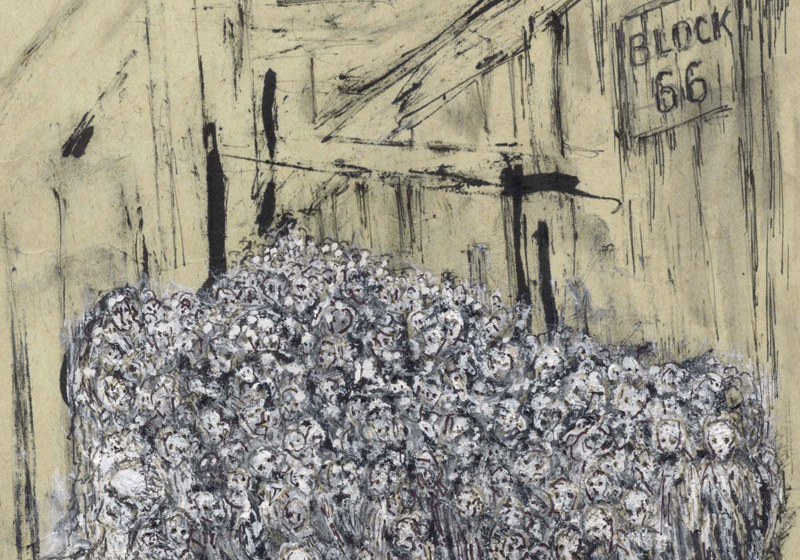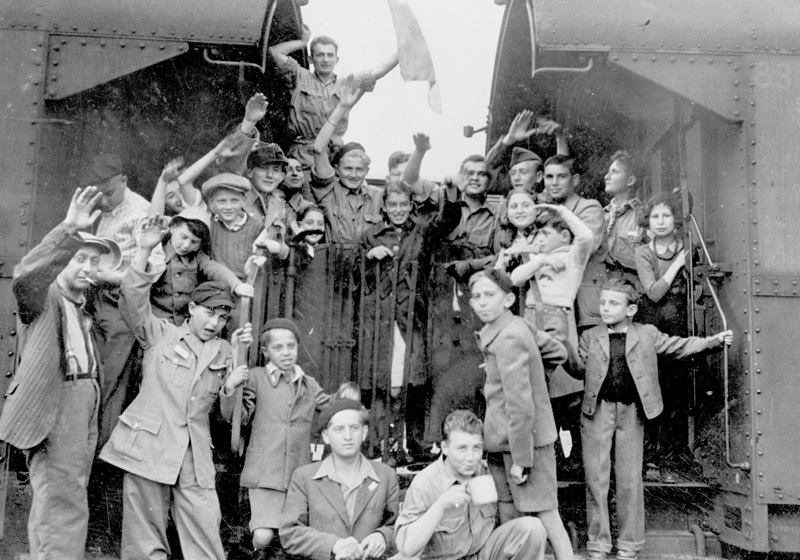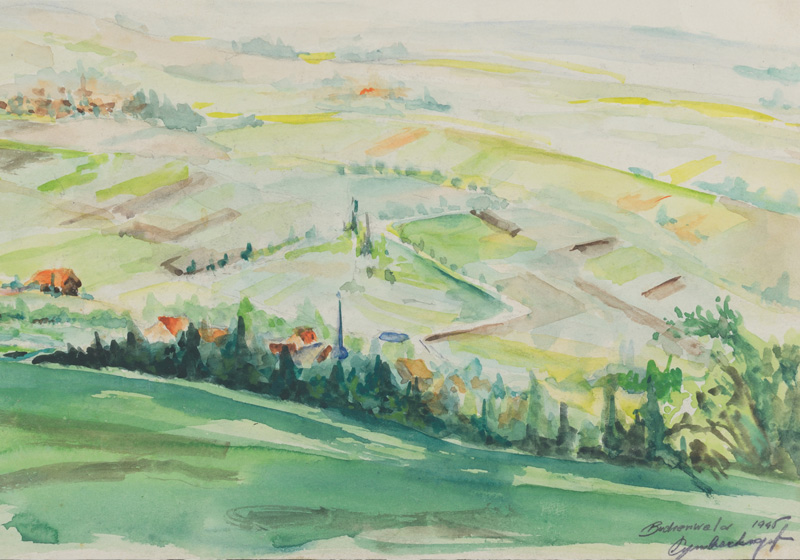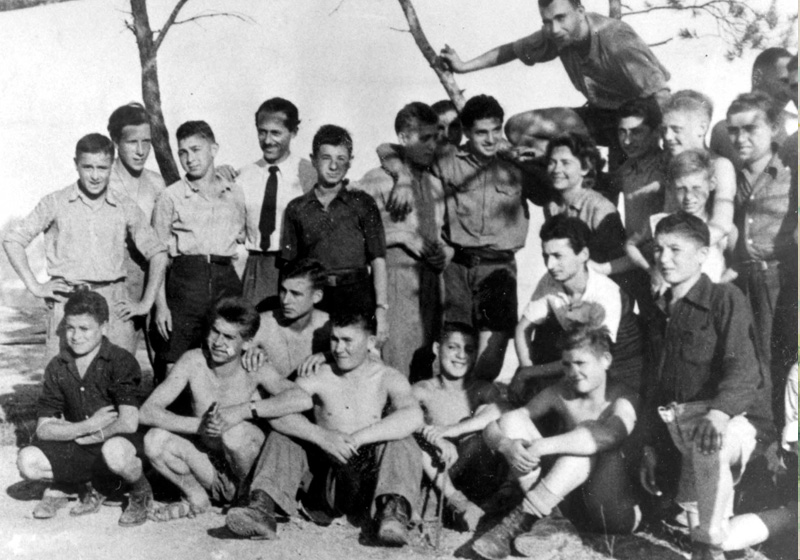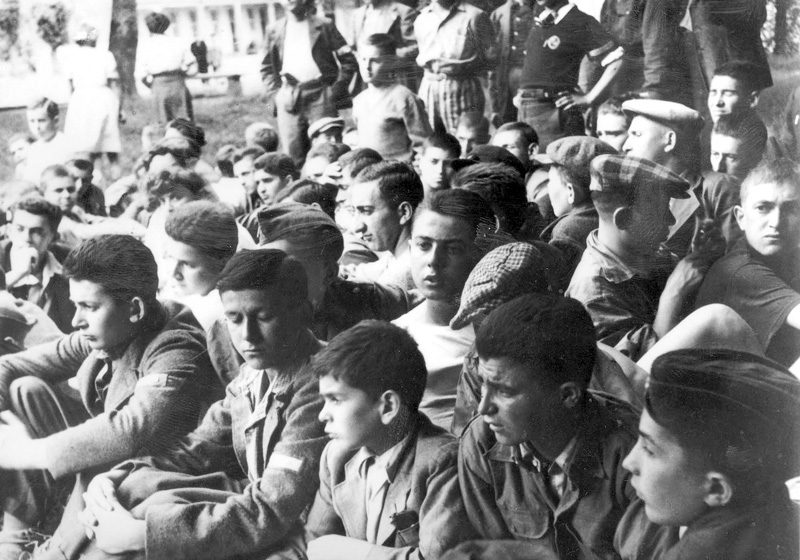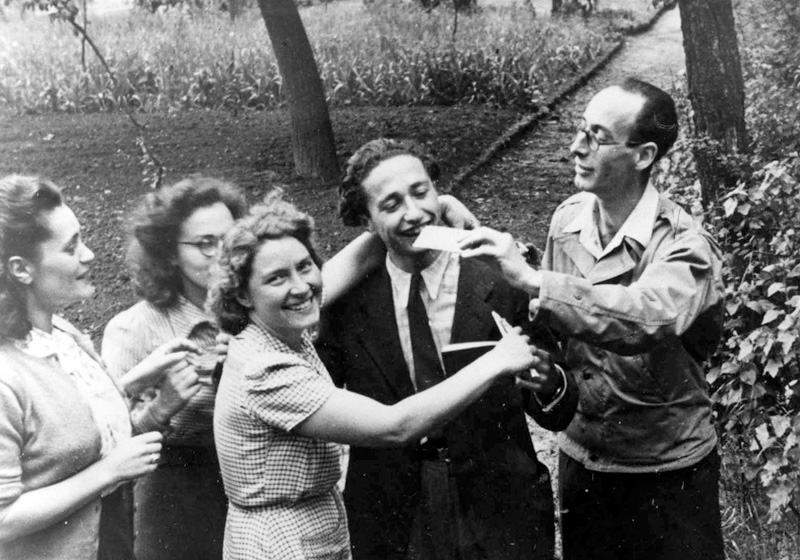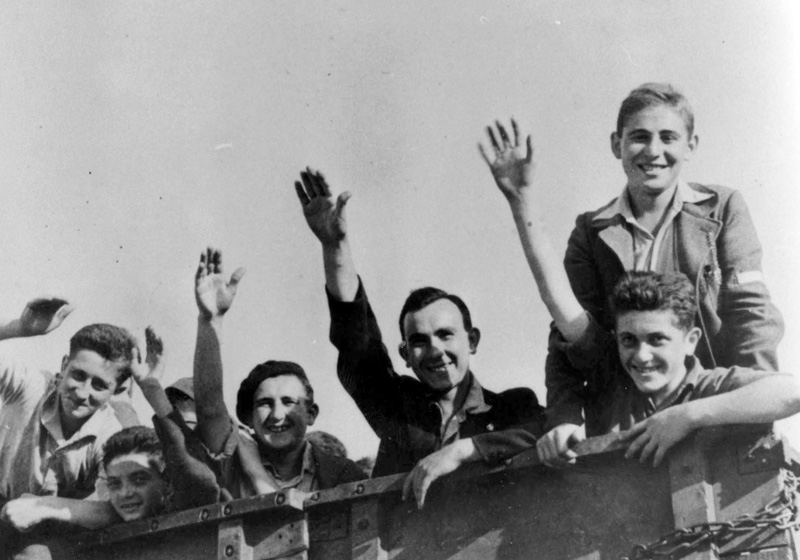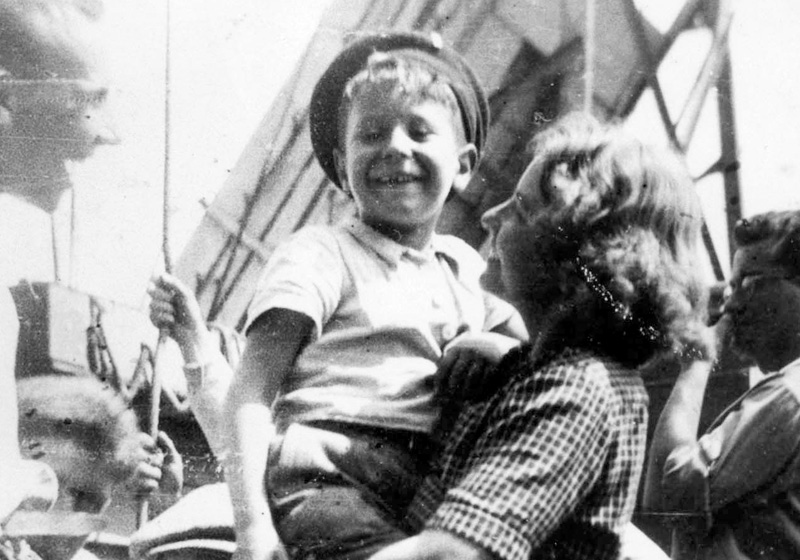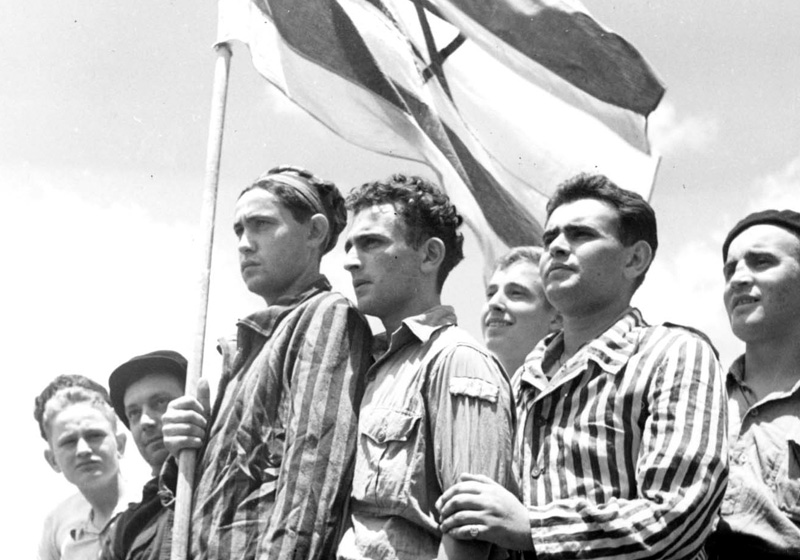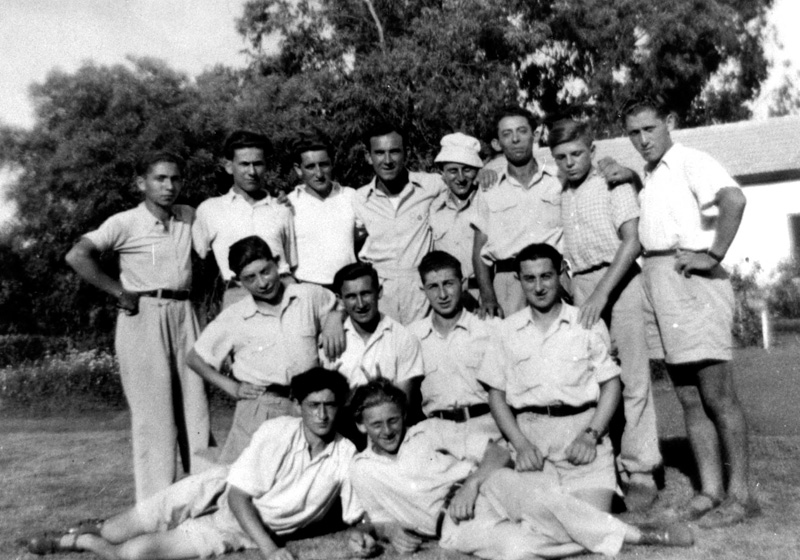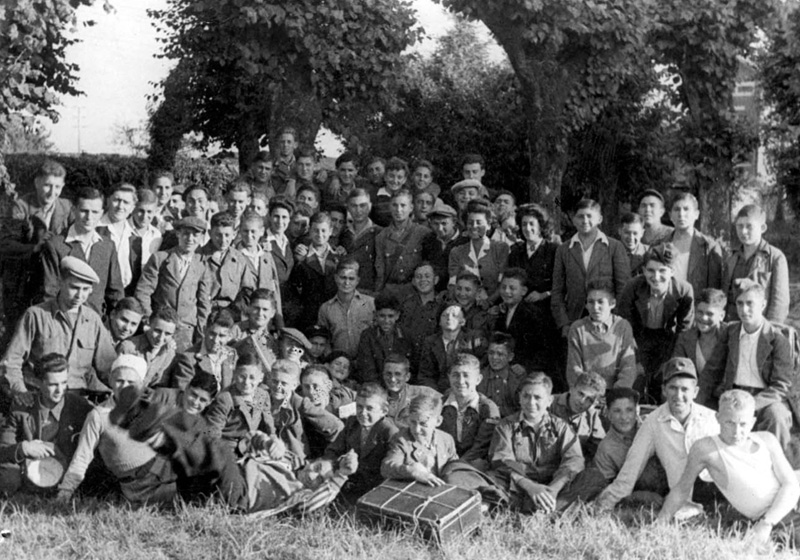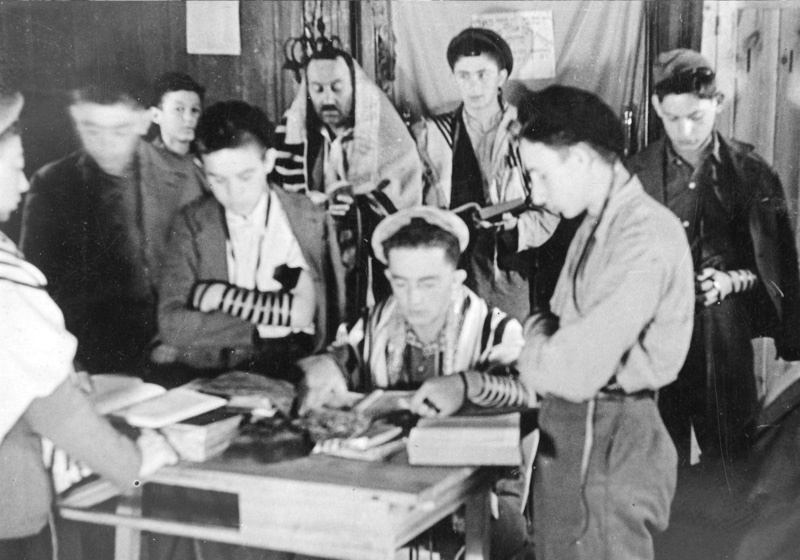Children's Homes for Holocaust Survivors
"My Lost Childhood"
The Children's Home in Écouis, France
The OSE Home for "Buchenwald Boys"
On 11 April 1945, the Buchenwald concentration camp was liberated by the US Army. Some 21,000 prisoners were released, of whom 4,000 were Jewish. The Jewish inmates included approximately 1,000 children, some of them just four years old. Among the liberators were US Army Chaplains Robert Marcus and Herschel Schacter, who arrived one or two days later.
Rabbi Schacter recalls:
I drove to this place called Buchenwald. I will never forget as long as I live the scenes that met my eyes that are indelibly engraved upon my heart and mind. … This inferno really tore at my heart. ... I asked, are there any Jews who are still alive. … There was a long line of barracks. … I walked into the first barracks that I came upon. … There were lines, shelves, raw planks of wood on which were strewn some stinking, scraggly straw sacks. And there they were, from floor to ceiling. I just stood there, I was overwhelmed. This was it. I actually came face to face with the stark, bitter, sordid reality of Jewish tragedy. I looked up at those people and there I saw eyes. They were nothing but skin and bones: they were starved, emaciated, they looked down at me out of those eyes that were haunted, crippled, paralyzed with fear, with confusion, they just didn't know where they were, what was happening. … Impulsively I shouted out in Yiddish…: "Shalom Aleichem Yiden, ihr sind frei! Jews you are free, the war is over! I'm an American, I'm a Rabbi!" They looked at me with such incredulous eyes. They couldn't believe what they were hearing, and I couldn't believe what I was seeing! … I went to the next barrack and the next barrack and. … I repeated my words. … I realized that these are flesh of my flesh… If my father had not caught the boat on time way back in 1903, I would have been there.
In Block 66, the liberators discovered several hundred Jewish children from Poland, Hungary, Romania and Czechoslovakia. All were boys, who had survived against all the odds with the help of the international underground in Buchenwald, some of whose members were Jewish. The children were in shocking physical and mental condition. A message was sent to the OSE offices in Geneva:
We have found approximately one thousand Jewish children in Buchenwald. Please organize evacuation without delay.
Members of the OSE (Oevre de Secours aux Enfants) organized the evacuation of these children, known as the "Buchenwald Boys" and their passage to France, Switzerland and England.
Zvi-Hirsch Peld was seventeen when he was liberated at Buchenwald. He was in a group that travelled to France. He relates:
I didn't harbor lust for revenge against the Germans. … We didn’t feel the destruction, so we certainly didn't feel the liberation. In order to feel the liberation, it was necessary to feel, but we did not feel anything. We were not people. … at that point we were sick. Sick in body and spirit. Everything hurt – our hands, our feet, our whole bodies hurt, and our souls hurt too.
At Buchenwald, the US Army provided the children with medical care, food and clothing. When the camp was liberated, they discovered a storehouse filled with German uniforms, and they gave these to the children to wear instead of the oversized striped camp garb. Many of the children wanted to immigrate to Eretz Israel (Mandatory Palestine), but due to British Mandate policies, which effectively closed the gates of Eretz Israel to Jews, they had no choice but to accept the OSE's offer and to travel to France, Switzerland or England.
On 2 June, the train left Buchenwald on its way to France carrying some 500 children and teenagers. The children stormed the train for fear that it would leave without them. They were accompanied by Rabbi Marcus and by OSE personnel. Dr. Ravel, one of the escorts, relates: "They wore striped pyjamas or Hitler Youth uniforms, and they looked like a rabble". When the train stopped en route, the children disembarked and pilfered whatever they could. They only stopped when they were told that they had reached France.
Mordechai Philip, one of the boys on the train, recalls:
When we alighted the train, it was full of children accompanied by Rabbi Marcus of the US Army. He came with us. … And he warned us not to cause damage. But we were children, and we liked wreaking havoc. We stopped the train more than once and went down into the fields. The fields were full of good things, like cherries and all kinds of things that we hadn't seen for a whole year. So we ripped up the trees and took entire trees onto the train with us so that we could eat.
Their initial reception in France was hostile. The French citizens saw boys in German uniforms, and at first they thought these were German youth. For this reason, the words "Buchenwald Concentration Camp – Orphans" were written in prominent white letters on the train. Four days later, the train reached Écouis in Normandy.
Écouis was a recuperation center for tuberculosis patients that the French government had assigned to the OSE. Some 500 children's beds were organized but only about 30 of the youngsters who arrived were 8-12 year-olds. The majority were boys and young men aged 13-26. They did not smile, they were taciturn, indifferent, introverted and suspicious. Their hair had only just started growing back, and they looked wild and unkempt. Some of them took blankets, sheets, eating and cooking utensils from the children's home in Écouis and bartered them for other provisions. The matron was Rachel Minc, an OSE activist who had looked after Jewish children in hiding during the war. Many times, the staff were at their wits' end as to how to get through to the boys. They had no conception of what the boys had endured – the youngsters would only talk about this amongst themselves. They didn't always have a common language. Elie Wiesel (later Nobel Peace Prize Laureate) was 16 when he reached Écouis. Recalling the staff, Wiesel wrote:
You thought you could educate us, and yet the youngest among us knew more than you of the value of things, of the futility of life, and of the brutal triumph of death. Impressed neither by your age nor your authority, we watched you with amusement and mistrust. We felt that we were stronger than you. … Uprooted, underprivileged, we had faith only in death. … Immured in the solitude of a destroyed childhood – robbed, humiliated – we wished to remain aloof. Each time a representative of the outside world tried to approach us, we withdrew further. We totally refused you. We did not want your help, your understanding, your psychological tests, your charity. You entered our lives too soon; we were still in mourning.
Jewish educator Leo Margolis was one of the individuals who came to Écouis from Buchenwald with the boys. Margolis was a Buchenwald inmate for six years. He endeavored to be an observant Jew for the entire length of his imprisonment, and was well respected by his fellow inmates. The boys at Écouis also trusted him. Margolis approached the management of the children's home and asked that the boys be provided with kosher food. Postwar France suffered from comprehensive shortages, and this was a difficult request to fulfil.
Originally from Lodz, Rachel Minc studied pedagogy in Berlin before the war, and served as director of the children's home in Écouis. During the war, Rachel worked clandestinely to rescue children in the Grenoble area. Recalling the children entrusted to her care in the children's home, she said:
They were a community of children, the first of its kind, in the face of which even the most liberal pedagogical approaches were ineffective. They bore a hostile distrust of human beings. If someone tried to stroke their cheek, they would flinch and recoil.
Many people came to Écouis to meet the children and youngsters who had survived Buchenwald. The boys remained indifferent to the speeches and gestures, and continued to shut themselves off. On one occasion, a Holocaust survivor came to visit. The children sat on the grass and the man stood before them. He was so moved that he couldn't utter a single word, but when he pulled up his sleeve he revealed the Auschwitz prisoner number tattooed on his arm. Tears began to stream down his cheeks. It had been a long time since the children had seen a grown man cry, and this sight released something inside them, causing them all to burst out crying too. One of the boys relates: "He restored our souls. He breathed life into the feelings that still simmered within us."
Amongst the visitors to Écouis were representatives of American Jewish organizations who tried to persuade the children to come with them to the USA, and representatives of local organizations who tried to convince them to remain in France. Philip recalls:
I had the chance to go to America, and the option of staying in France. But my battle, dating back to when I lived at home, was to go to Eretz Israel. I couldn't give up on that. … I wanted to go to Eretz Israel, and I couldn't hear the word "Zhyd" one more time. I just couldn't hear it anymore. I'd had enough, so I decided that I would only go to Eretz Israel.
On 2 July 1945, the first group left Écouis for Eretz Israel. Some 150 children with immigration permits escorted by several adults boarded the "Mataroa" ship. Amongst the passengers were 8-year-old "Lolek" (later Rabbi Israel Meir Lau) and his 17-year-old brother, Naftali Lau (Lavie). Naftali relates;
When I was already well enough I decided we have to go to Palestine. None of us thought of going back to Poland or Hungary or Lithuania. … In France there were attempts made by the local community to absorb us in the French Jewish community, to revive the community. … I was among those who went to Paris to find ways to get to the Jewish Agency emissaries. We succeeded. ... We brought to their attention. … that we have nearly five hundred youngsters, most of them wanted to go to Palestine. … They could only take 152. … We arrived [in Haifa] on 15 July 1945, and here began my normal life.
The children's home in Écouis was planned as a transit stop, and the boys were there between four-eight weeks. The home closed its doors in August 1945. Approximately 80 of the children were transferred to the children's home in Ambloy, where they received kosher food and a religious education. Margolis went with them to Ambloy, as did one of the caregivers, Gabi Wolf-Cohen, who was known as "Niny". The rest of the children were dispersed amongst other children's homes, were placed with foster families, or were reunited with relatives. Most of them left France in 1947-8 and immigrated to Eretz Israel, the US, Canada and Australia.
In 1990, the book "The Children of Buchenwald : Child Survivors and Their Post-War Lives" was published, telling the story of the children's homes for Buchenwald survivors in France. The book was written by Judith Hemmendinger-Feist, director of the children's home in Ambloy, who later accompanied the Buchenwald boys to the children's home in Taverny.
Hemmendinger concludes her book with a few words about the Buchenwald survivors under her care with whom she remained in contact:
The few who have tried to speak were not believed; they soon realized that it was impossible to impart the meaning of deportation and concentration camp life… physical and psychological injuries, the humiliation of having been no more than a number, and the guilt of having survived while all members of their families died were such that they were unable to express their inner feelings – and this has not changed to this date. … Neither Niny [Gabi Wolf-Cohen] or myself could fully comprehend the extent of the psychological trauma. … and were unaware of the uniqueness of their "surviving". … Being of about the same age. … we accepted the boys as they were, simply trusting them without trying to force anything upon them. I decided to write this book because I am proud of them and of what they have achieved; I admire their courage and their strength.


